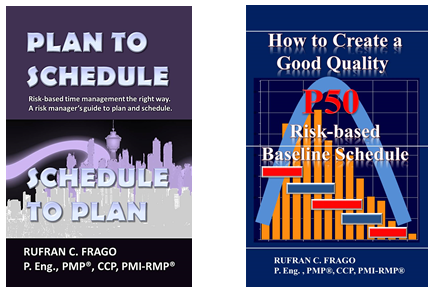
The journey of learning risk and how to manage it is most rewarding to the curious thinker. Curiosity generates interest. Interest produces efforts that result in good education.
The 2009 PMI Global Practice Standard for Project Risk Management, Chapter 2, Section 2.2 (page 9) defines risk as an uncertain future event or condition that could have a positive or negative effect on objectives if it occurs. In a project environment, the definition goes like this: project risk is an uncertain future event or condition that, if it occurs, could have a positive or negative effect on project objectives. The same line of thinking will be true when one talks about a specific risk category such as financial risk, safety risk, business risk, operation risk, or others.
As you have probably readily appreciated in the preceding paragraph, “risk is always in the future.” It is therefore redundant to say “future risk”, a term I often hear from project people when they talk about the subject.
Two key components of risk are probability, and impact. They describe probability of achieving objectives and effect on objectives respectively.
Possible future events must be evaluated and analysis done using the two measures. The probability dimension describes the uncertainty or certainty of a schedule or budget. Impact on the other hand describes the consequence of the risk just in case it does happen (PMI, Project Risk Management, 2013).
Risk is not equal to just any of its own singular attribute. The very existence of risk depends on the function of uncertainty, consequence, and time. How can risk be mistaken to be just a part of its wholeness?
The set theory makes us aware about the concept of uncertainty as a big system where risk resides. The reason why I asked the question emanates from the measure of uncertainty. Given a risk that revolves around a given objective, uncertainty as a system is impossible to measure.
The present accepted measure of uncertainty is probability. We can calculate the probability of an identified and specific risk because we can appreciate the uncertainty boundary (or field) where it lies. Understanding and awareness become a blur when one attempts to go outside this boundary. I refer to it as the uncertainty boundary of understanding.
The finite boundary or a piece of the whole uncertainty system is the only useful element in appreciating risk. It is a piece of the uncertainty concept that has practical use.
The idea of risk and its attributes appears simple enough, yet it can be bigger and more complex than it appears. Human comprehension is infinitely varied, limited only by an individual’s imagination, and this will shape their understanding of the concept of risk. It is not surprising that, out of the many recent great exchanges, we still have relatively no significant additions to the governing laws of risk that can usher a new era of higher event predictability, including their great implications to risk-based management. This is despite the advent of big data.
Have you ever stopped doing what you were doing, sat down, and asked yourself, “What is the purpose of life? What is it that people do every day? What is it that matters most to a person regardless of demographic?”
There are various perspectives; however, it all comes down to one central element, and that is to manage risk. Yes, the purpose of life is managing risk. Even in our sleep, and in our dreams, we administer risks. In our beliefs, in our religion, in our pursuit to be a good person, we manage risks. People have to manage daily the risk of sin, e.g. of temptation, of jealousy, gluttony, revenge, and greed. One needs to control his vice, his expenses, his career, and many others.
Why I did not think of that concept many years before today is a mystery. It is in front me, in all of us, and in the very fabric of our daily life. Risk management is the only thing we do for a living. This intriguing concept drives the reason we go to work every day.
We all have one main, central purpose in life yet we all go about it almost unconsciously.
Source:
Rufran C. Frago-Author
Related sites:
Other books authored by Rufran Frago
- Plan to Schedule, Schedule to Plan.ISBN 978-0-9947608-2-1.Canada
- How to Create a Good Quality P50 Risk-based Baseline Schedule.ISBN 978-0-9947608-1-4.Canada

You must be logged in to post a comment.